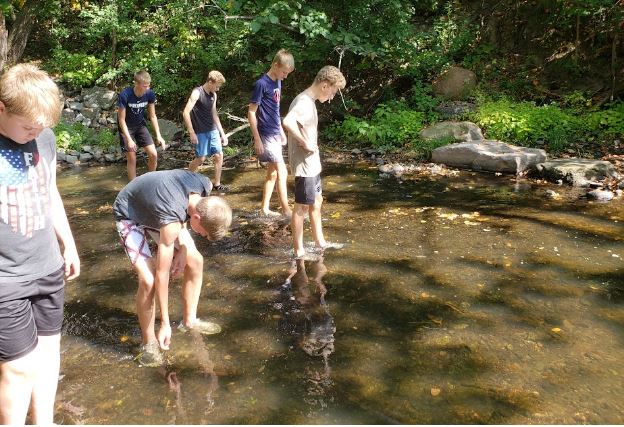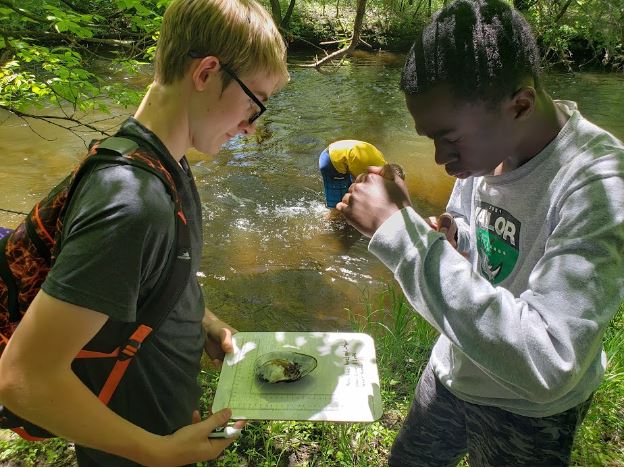I am standing on the bridge in a local park near our high school in Fridley, Minnesota. It is a beautiful day to be outside. The leaves are still green overhead, but you can tell that fall is just around the corner. From the stream down below I hear the back and forth of several high school boys.
“Yes! I found one.”
“Fatmucket?”
“I am not sure, the edge is kind of rounded.”
“Probably just a Giant Floater.”
“At least it’s a live mussel! All you have found is dead Heel Splitters filled with sand.”
To any other park user, these young people standing knee deep in the stream might look like they are skipping school and calling each other names, but they are actually living out my deepest hope as a Christian school science teacher. They are caring for creation by doing real work to meet a real scientific need in the real world.
For the past three years, my students and I have been collaborating with freshwater mussel researcher Mark Hove. Our goal is to study the Fatmucket, a native freshwater mussel, and how its life cycle is impacted by road salt.
For the past three years, my students and I have been collaborating with freshwater mussel researcher Mark Hove. Our goal is to study the Fatmucket, a native freshwater mussel, and how its life cycle is impacted by road salt. We are doing real research. We are asking novel questions and setting up novel experiments. Unlike the tried and true experiments from my chemistry class, some of our experiments have failed, but then we improved them and tried them again. We are producing data that people outside of our classroom care about. In fact, in the past year, Mark Hove has published two articles sharing the data that our high school students helped gather, and we are working toward two more articles in the coming year.
What Is Citizen Science?
Producing data that other people care about is core to citizen science. An exact definition of what constitutes citizen science and what does not is still being parsed out. However, in an article pressing for an internationally recognized definition of citizen science, Heigl and his co-authors identify that “citizen science has amazing potential as an innovative approach to data gathering and experimental design, as well as an education and outreach tool.” Other in the article praise citizen science for “democratizing science” and for it being “science with and for society” (Heigl 8090). As a high school educator, what citizen science means to me is that my students are participating in science that matters beyond the classroom walls.
As a high school educator, what citizen science means to me is that my students are participating in science that matters beyond the classroom walls.
How Did We End Up in a Stream Studying Mussels?
Mussel research is not my first connection to citizen science. In the mid-2000s I was introduced to the River Watch program run through Hennepin County. Since 2008, my environmental science students have collected and classified aquatic macroinvertebrates (insects). The county uses this data to measure stream health based on the sensitivity of each family and/or genus of insect to pollution. Each year our school completes this work and reports our findings to the county, meaning that there is now an archive with nearly fifteen years of data because of the work that students are doing.
Also in the past decade our school has adopted Teaching for Transformation(TfT) (for more about TfT see www.teachingfortransformation.org). One of TfT’s core practices is for students to engage in Formational Learning Experiences (FLEx), and it was during an afternoon professional development dedicated to FLEx development that I was prompted to imagine a way to continue to engage my science students in real work by connecting to a different stream, Rice Creek, which is located within walking distance of the school. I began by contacting the watershed district, and one connection led to another until I found myself standing in the wet lab at the University of Minnesota hatching plans with Mark Hove about how my students could partner with him to study the impact of salt on the life cycle of freshwater mussels. The path was not straight but it certainly was serendipitous, and it started because of TfT’s push to have students do real work in the real world to meet a real need.
Work Cited
Heigl, Florian, et al. “Toward an International Definition of Citizen Science.” Proceedings on the National Academy of Science, April 23, 2019, www.pnas.org/doi/10.1073/pnas.1903393116.
James Vande Glind teaches at Avail Academy in Fridley, Minnesota. He earned his BA from Dordt College (2004) and MA from Hamline University (2013). He has also been a TfT lead teacher.

